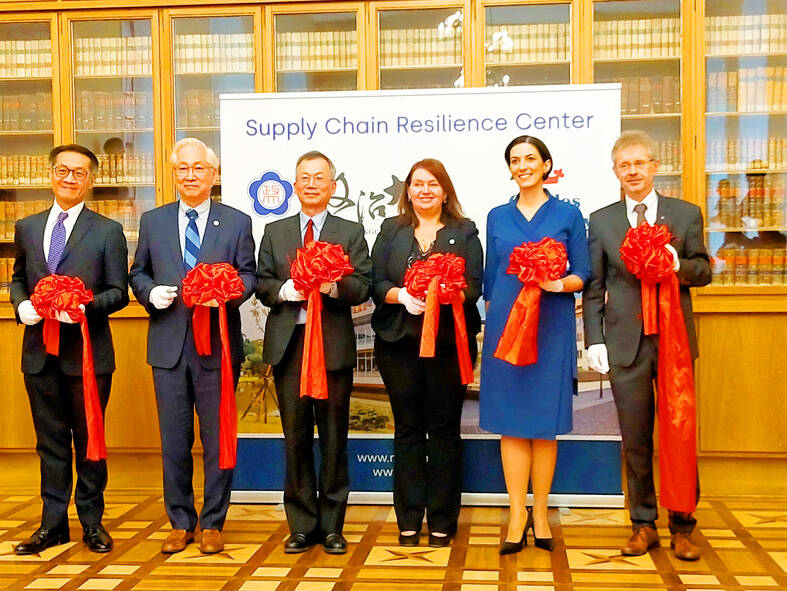National Chengchi University (NCCU) has set up a research center in the Czech Republic to explore supply chain resilience and semiconductor development, the National Science and Technology Council (NSTC) said yesterday.
The Supply Chain Resilience Center was created in collaboration with Prague-based Charles University and inaugurated by NCCU president Li Tsai-yen (李蔡彥) and Charles University rector Milena Kralickova at a ceremony on Friday, the council said in a news release.
The ceremony was witnessed by Czech Senate President Milos Vystrcil and NSTC Minister Wu Tsung-tsong (吳政忠), who is leading a delegation on a trip to Europe, the council said.

Photo courtesy of the National Science and Technology Council
Taiwan and the Czech Republic have a lot to learn from each other, most notably in the field of semiconductors, Vystrcil said, lauding the continuing cooperation between the two sides.
In addition to the semiconductor industry, generative artificial intelligence (AI) also plays an important role, Wu said, adding that Taiwan has already begun to promote the development of chip-based generative AI applications in several fields.
Taiwan would be happy to share experience and cooperate with the Czech Republic, he said, expressing hope that scientific and technological cooperation between the two countries be further promoted.
A Charles University release said that the center is part of a so-called “multiproject” in which Taipei is supporting the development of the semiconductor environment in the Czech Republic.
Through the center, the two universities would be exploring the capacity of chip manufacturing and its sustainability, including its impact on the environment and climate in general, the release said.

CHAOS: Iranians took to the streets playing celebratory music after reports of Khamenei’s death on Saturday, while mourners also gathered in Tehran yesterday Iranian Supreme Leader Ayatollah Ali Khamenei was killed in a major attack on Iran launched by Israel and the US, throwing the future of the Islamic republic into doubt and raising the risk of regional instability. Iranian state television and the state-run IRNA news agency announced the 86-year-old’s death early yesterday. US President Donald Trump said it gave Iranians their “greatest chance” to “take back” their country. The announcements came after a joint US and Israeli aerial bombardment that targeted Iranian military and governmental sites. Trump said the “heavy and pinpoint bombing” would continue through the week or as long

TRUST: The KMT said it respected the US’ timing and considerations, and hoped it would continue to honor its commitments to helping Taiwan bolster its defenses and deterrence US President Donald Trump is delaying a multibillion-dollar arms sale to Taiwan to ensure his visit to Beijing is successful, a New York Times report said. The weapons sales package has stalled in the US Department of State, the report said, citing US officials it did not identify. The White House has told agencies not to push forward ahead of Trump’s meeting with Chinese President Xi Jinping (習近平), it said. The two last month held a phone call to discuss trade and geopolitical flashpoints ahead of the summit. Xi raised the Taiwan issue and urged the US to handle arms sales to

BIG SPENDERS: Foreign investors bought the most Taiwan equities since 2005, signaling confidence that an AI boom would continue to benefit chipmakers Taiwan Semiconductor Manufacturing Co’s (TSMC, 台積電) market capitalization swelled to US$2 trillion for the first time following a 4.25 percent rally in its American depositary receipts (ADR) overnight, putting the world’s biggest contract chipmaker sixth on the list of the world’s biggest companies by market capitalization, just behind Amazon.com Inc. The site CompaniesMarketcap.com ranked TSMC ahead of Saudi Aramco and Meta Platforms Inc. The Taiwanese company’s ADRs on Tuesday surged to US$385.75 on the New York Stock Exchange, as strong demand for artificial intelligence (AI) applications led to chip supply constraints and boost revenue growth to record-breaking levels. Each TSMC ADR represents

Pro-democracy media tycoon Jimmy Lai’s (黎智英) fraud conviction and prison sentence were yesterday overturned by a Hong Kong court, in a surprise legal decision that comes soon after Lai was jailed for 20 years on a separate national security charge. Judges Jeremy Poon (潘兆初), Anthea Pang (彭寶琴) and Derek Pang (彭偉昌) said in the judgement that they allowed the appeal from Lai, and another defendant in the case, to proceed, as a lower court judge had “erred.” “The Court of Appeal gave them leave to appeal against their conviction, allowed their appeals, quashed the convictions and set aside the sentences,” the judges